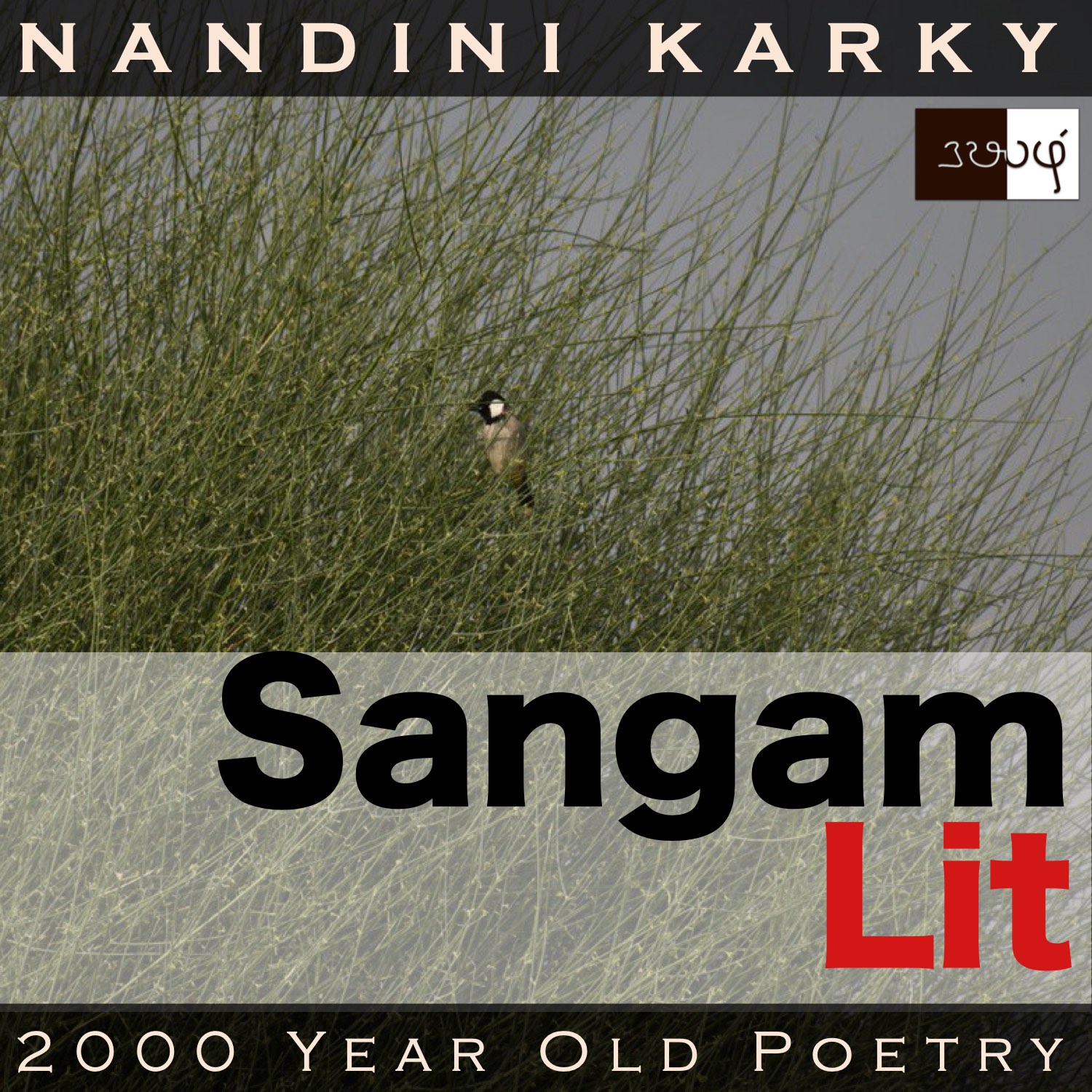Podcast: Play in new window | Download
Subscribe: Apple Podcasts | Spotify | Amazon Music | Android | iHeartRadio | Email | TuneIn | RSS | More

In this episode, we sense the jubilation in a man’s return to his home, as portrayed in Sangam literary work, Natrinai 181, penned by an anonymous poet. The verse is set in the ‘Mullai’ landscape or forest country and speaks in the voice of a confidante, conveying that the lady will be redeemed from her joyless state by the man’s return.
உள் இறைக் குரீஇக் கார் அணற் சேவல்
பிற புலத் துணையோடு உறை புலத்து அல்கி,
வந்ததன் செவ்வி நோக்கி, பேடை
நெறி கிளர் ஈங்கைப் பூவின் அன்ன
சிறு பல் பிள்ளையொடு குடம்பை கடிதலின்,
துவலையின் நனைந்த புறத்தது அயலது
கூரல் இருக்கை அருளி, நெடிது நினைந்து,
ஈர நெஞ்சின் தன் வயின் விளிப்ப,
கையற வந்த மையல் மாலை
இரீஇய ஆகலின், இன் ஒலி இழந்த
தார் அணி புரவி தண் பயிர் துமிப்ப
வந்தன்று, பெருவிறல் தேரே;
உய்ந்தன்றாகும், இவள் ஆய் நுதற் கவினே.
The poem starts with the image of a ‘sparrow nesting within the eaves of a house’ as depicted by ‘உள் இறைக் குரீஇ’. Another soothing image from nature greets us in ‘நெறி கிளர் ஈங்கைப் பூ’ meaning ‘well-arranged twisted acacia flowers’. In ‘துவலையின் நனைந்த புறத்தது’ we glimpse at the ‘body of a sparrow soaking in the pouring rain’. The phrase ‘ஈர நெஞ்சின்’ brings the spotlight on a ‘compassionate heart’. Fascinating to see the portrayal of a kind heart here, as one that lets feelings seep within, like rain. ‘மையல் மாலை’ sets the time of the day and talks about a ‘confusing evening’ that brings pain in the parted. The verse ends with two more striking images – One, ‘பெருவிறல் தேரே’ meaning ‘the great, victorious chariot’ and ‘ஆய் நுதற் கவினே’ meaning ‘the beauty of her excellent forehead’. Moving beyond glimpses, let’s get to know the verse better.
The man had departed from the lady on a mission, leaving her in a state of pining. Hearing the news that he had successfully completed his mission and was returning home, the confidante says, “The black-necked male of the sparrow that lives on the inner eaves of a home, parts away to another female and stays there for a while. Seeing its male return with signs of being with another, the mate, along with its many little chicks, looking like neatly arranged ‘eengai’ flowers, blocks the male from entering the nest. Seeing the back of its male drenched in the rain, thinking deep, with a kind heart, the female takes pity on its mate’s shivering form and beckons it to come within. On such an evening that fills one with helplessness, ride by those horses adorned with garlands, with their bells bereft of their sweet sounds owing to the rains. They slice off the green crops along the way, announcing the arrival of the man’s victorious chariot! Indeed, it has been saved – the beauty of her fine forehead!” With these words, the confidante recollects an incident of love-quarrel between the man and lady and rejoices how there’s no room for that now, as he returns straight from his task to wipe away the lady’s sorrow.
Now, to pause and pay attention to the inner depths of the story! The confidante sketches a scene from the life of a pair of sparrows. A male and female sparrow had built a nest and were living happily in their home. The female birthed little ones and the male went missing for a while. It turns out that the male had gone to seek the company of another female bird. One day, the male returns to its home but perceiving the signs of being with another, the female and the chicks, looking like fluffy acacia flowers, block the male from entering the nest. The male stands there, with its back soaked in the drenching rain. Seeing it shivering there, the female with its kind nature, after reflecting well, asks the male bird to enter the nest. The confidante relates this scene to depict the time and weather in the land, saying all this is happening on a rainy evening that brings pain to the parted. Such an elaborate depiction must conceal within hidden metaphors. Indeed, the confidante recollects how the lady, angered by the man’s straying away, had refused to allow him to enter the house, sometime ago. Then, owing to her kind heart, she took him back and they were leading a happy life. Now, the man returns from a separation that is not steeped in a fall from virtue as in the case of his straying to a courtesan but in the virtue of doing his duty, earning wealth or supporting his king in battle. This we know because the confidante calls his chariot as one filled to the brim with a great victory. Indeed, the bells may not resound like before, because of the rains, but the joyous thing is that, the man returns.
The confidante talks about how the horses trot towards home, slicing the grass growing in their path and likewise, she believes the man’s return will wipe away the pallor of pining that spreads on the lady’s forehead. A poem that stresses on the magnanimity and forgiving nature of a woman, who epitomises a love, filled with kindness!




Share your thoughts...